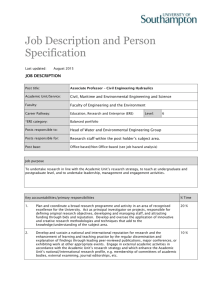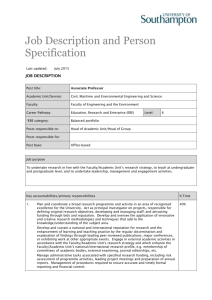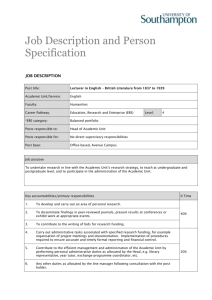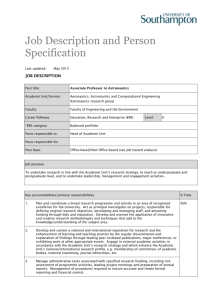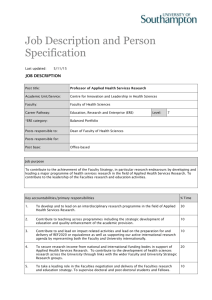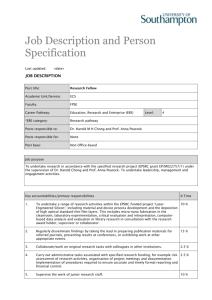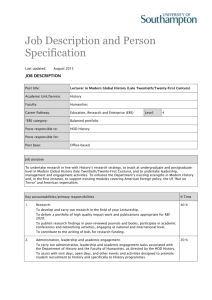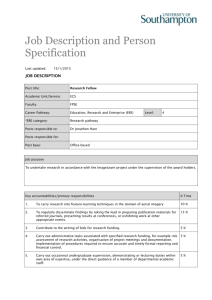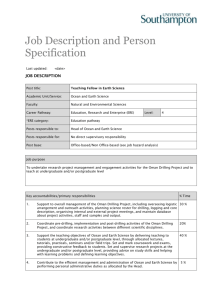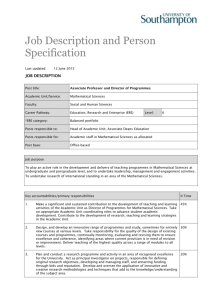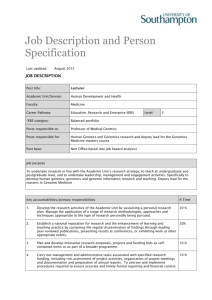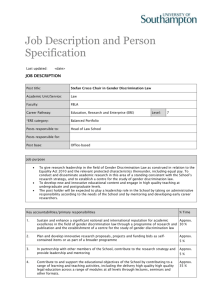Associate Professor Job Description
advertisement
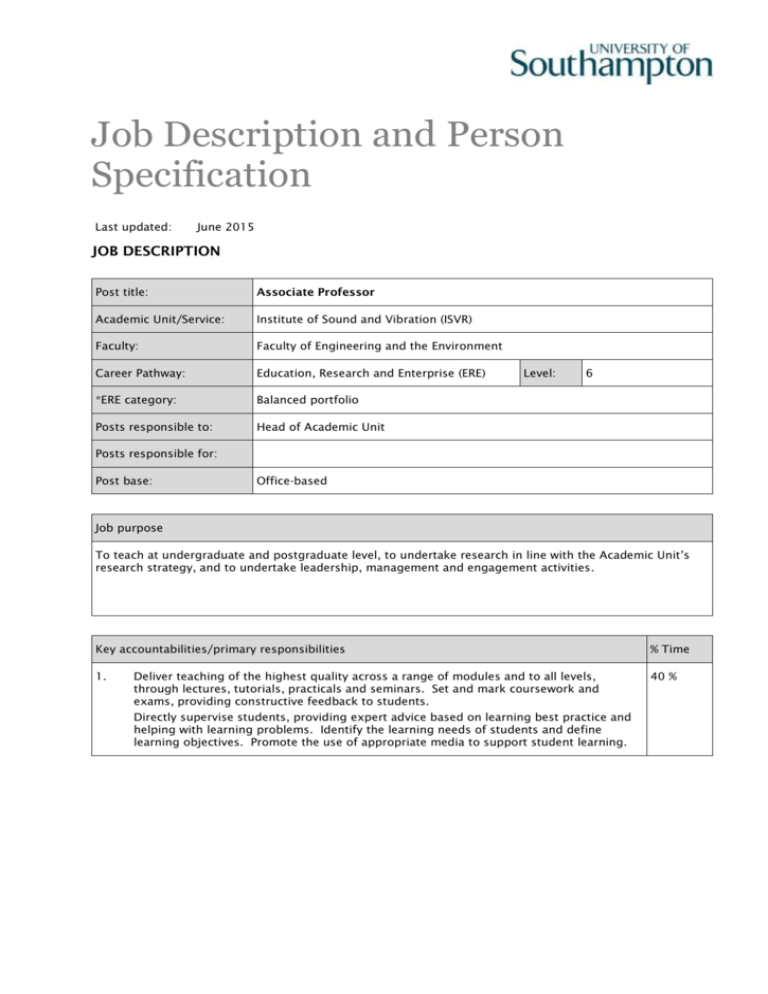
Job Description and Person Specification Last updated: June 2015 JOB DESCRIPTION Post title: Associate Professor Academic Unit/Service: Institute of Sound and Vibration (ISVR) Faculty: Faculty of Engineering and the Environment Career Pathway: Education, Research and Enterprise (ERE) *ERE category: Balanced portfolio Posts responsible to: Head of Academic Unit Level: 6 Posts responsible for: Post base: Office-based Job purpose To teach at undergraduate and postgraduate level, to undertake research in line with the Academic Unit’s research strategy, and to undertake leadership, management and engagement activities. Key accountabilities/primary responsibilities % Time 1. 40 % Deliver teaching of the highest quality across a range of modules and to all levels, through lectures, tutorials, practicals and seminars. Set and mark coursework and exams, providing constructive feedback to students. Directly supervise students, providing expert advice based on learning best practice and helping with learning problems. Identify the learning needs of students and define learning objectives. Promote the use of appropriate media to support student learning. Key accountabilities/primary responsibilities 2. % Time Contribute to the development of research, teaching and learning strategies in the 40 % Academic Unit. Take responsibility for overseeing, developing and promoting fresh teaching and learning approaches and material, which create interest, understanding and enthusiasm amongst students. Design, develop and deliver an innovative range of modules or programmes of study, sometimes for entirely new courses at various levels. Take responsibility for the quality of the design of existing courses and programmes, continually monitoring, evaluating and revising them to ensure excellence and coherence, identifying areas where current provision is in need of revision or improvement. Plan and coordinate a broad research programme and activity in an area of recognised excellence for the University. Act as principal investigator on projects, responsible for defining original research objectives, developing and managing staff, and attracting funding through bids and reputation. Develop and oversee the application of innovative and creative research methodologies and techniques that add to the knowledge/understanding of the subject area. Develop and sustain a national and international reputation for research and the enhancement of learning and teaching practice by the regular dissemination and explanation of findings through leading peer-reviewed publications, major conferences, or exhibiting work at other appropriate events. Engage in external academic activities in accordance with the Academic Unit’s research strategy and which enhance the Academic Unit’s national/international research profile, e.g. membership of committees of academic bodies, external examining, journal editorships, etc. 3. Manage administrative tasks associated with specified research funding, including risk 20 % assessment of programme activities, leading project meetings and preparation of annual reports. Management of procedures required to ensure accurate and timely formal reporting and financial control. Provide expert advice and subject leadership to other staff and students, including research supervision. Take on appropriate Academic Unit coordinating roles to advance student academic development, e.g. act as Senior Tutor, Head of Teaching Programme at undergraduate or postgraduate levels, lead in outreach, recruitment and in liaising with placement centres for students. This may also include roles in Represent the Academic Unit/Faculty/University in the disciplinary community externally. Any other duties as allocated by the line manager following consultation with the post holder. Internal and external relationships Member of Academic Unit committees relevant to their administrative duties. New appointees will be assigned a senior colleague to guide their development and aid their integration into the Academic Unit and University. Research priorities will be agreed within the strategic framework of the research theme of which they are a member. Teaching and administrative duties will be allocated by the Head of Academic Unit, within the context of the teaching programmes. Special Requirements To attend national and international conferences for the purpose of disseminating research results. To visit placement centres and attend and/or provide training courses at external locations. Document1ERE Level 6 – Balanced Pathway – Associate Professor 2 PERSON SPECIFICATION Criteria Essential Desirable Qualifications, knowledge and experience PhD or equivalent / equivalent professional qualifications and experience in vibration or other relevant area. Involvement and leadership in national and international events in vibration or related field How to be assessed CV/Interview Teaching qualification (PCAP or Extensive track record of teaching at equivalent) undergraduate and postgraduate Extensive track record of developing level. and disseminating successful learning approaches Well-established national and international reputation in vibration. Membership of Higher Education Consistent track record in attracting Academy research funding Extensive track record of published research Planning and organising Proven ability to plan, manage, organise and assess own teaching contributions. Able to build research/teaching teams CV/Interview Proven ability in the design of course units, curriculum development and new teaching approaches in the Academic Unit, taking primary responsibility for their quality Proven ability to plan and shape the direction of an area of research and teaching activity, ensuring plans complement broader research and education strategy. Proven ability to develop innovative research proposals and attract research funding. Able to contribute to the development of research and teaching policy within the Academic Unit. Problem solving and initiative Proven ability to develop significant new concepts and original ideas within own field in response to intractable issues of importance to the research area Interview Management and teamwork Able to mentor, manage, motivate and coordinate teaching/research teams, delegating effectively. Able to resolve performance issues and formulate staff development plans, where appropriate, to ensure team aims are met CV/interview Proven ability to manage and deliver own course units and team-taught course units Proven ability to coach, advise and support others (staff and students) on learning and teaching issues. Able to foster and develop good relationships between own Academic Unit and the rest of the university. Document1ERE Level 6 – Balanced Pathway – Associate Professor 3 Able to work proactively with senior colleagues to develop crossAcademic Unit and institution cooperation and effectiveness Able to contribute to the running of the Academic Unit by managing significant Academic Unit processes Able to monitor and manage resources and budgets Work effectively in a team, understanding the strengths and weaknesses of others to help teamwork development Able to manage collaboration with external hearing service providers and health-care industry. Able to manage recruitment and engagement activities with patients, schools and the wider public Communicating and influencing Communicate new and complex information effectively, both verbally and in writing, engaging the interest and enthusiasm of the target audience Interview Able to communicate effectively in a multidisciplinary environment and with patients Extensive track record of presenting research results at group meetings and conferences Extensive track record of delivering lectures and seminars in courses relating to different aspects of vibration. Able to engage counselling skills and pastoral care, where appropriate Able to persuade and influence at all levels in order to foster and maintain relationships, resolving tensions/difficulties as they arise Able to provide expert guidance to colleagues in own team, other work areas and institutions to develop understanding and resolve complex problems Able to negotiate for the Academic Unit on key issues Able to develop and lead key communications strategies Other skills and behaviours Compliance with relevant Health & Safety issues Interview Positive attitude to colleagues and students Special requirements Able to attend national and international conferences to present research results Interview Able to travel nationally and internationally for recruitment activities Document1ERE Level 6 – Balanced Pathway – Associate Professor 4 Document1ERE Level 6 – Balanced Pathway – Associate Professor 5 JOB HAZARD ANALYSIS Is this an office-based post? ☐ Yes If this post is an office-based job with routine office hazards (eg: use of VDU), no further information needs to be supplied. Do not complete the section below. ☐ No If this post is not office-based or has some hazards other than routine office (eg: more than use of VDU) please complete the analysis below. Hiring managers are asked to complete this section as accurately as possible to ensure the safety of the post-holder. ## - HR will send a full PEHQ to all applicants for this position. Please note, if full health clearance is required for a role, this will apply to all individuals, including existing members of staff. ENVIRONMENTAL EXPOSURES Occasionally Frequently Constantly (<30% of time) (30-60% of time) (> 60% of time) Outside work Extremes of temperature (eg: fridge/ furnace) ## Potential for exposure to body fluids ## Noise (greater than 80 dba - 8 hrs twa) ## Exposure to hazardous substances (eg: solvents, liquids, dust, fumes, biohazards). Specify below: Frequent hand washing Ionising radiation EQUIPMENT/TOOLS/MACHINES USED ## Food handling ## Driving university vehicles(eg: car/van/LGV/PCV) ## Use of latex gloves (prohibited unless specific clinical necessity) ## Vibrating tools (eg: strimmers, hammer drill, lawnmowers) PHYSICAL ABILITIES Load manual handling Repetitive crouching/kneeling/stooping Repetitive pulling/pushing Repetitive lifting Standing for prolonged periods Repetitive climbing (ie: steps, stools, ladders, stairs) Fine motor grips (eg: pipetting) Gross motor grips Repetitive reaching below shoulder height Repetitive reaching at shoulder height Repetitive reaching above shoulder height PSYCHOSOCIAL ISSUES Face to face contact with public Lone working ## Shift work/night work/on call duties Document1ERE Level 6 – Balanced Pathway – Associate Professor 6
